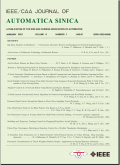首页|期刊导航|自动化学报(英文版)|Privacy-Preserving Consensus-Based Distributed Economic Dispatch of Smart Grids via State Decomposition
自动化学报(英文版)2024,Vol.11Issue(5):1250-1261,12.DOI:10.1109/JAS.2023.124122
Privacy-Preserving Consensus-Based Distributed Economic Dispatch of Smart Grids via State Decomposition
Privacy-Preserving Consensus-Based Distributed Economic Dispatch of Smart Grids via State Decomposition
摘要
关键词
Consensus-based DED algorithm/privacy preser-vation/smart grids/state decompositionKey words
Consensus-based DED algorithm/privacy preser-vation/smart grids/state decomposition引用本文复制引用
Wei Chen,Guo-Ping Liu..Privacy-Preserving Consensus-Based Distributed Economic Dispatch of Smart Grids via State Decomposition[J].自动化学报(英文版),2024,11(5):1250-1261,12.基金项目
This work was supported in part by Shenzhen Key Laboratory of Control Theory and Intelligent Systems(ZDSYS20220330161800001),the National Natural Science Foundation of China(62303210,62173255,62188101),the Guangdong Basic and Applied Basic Research Foundation of China(2022 A1515110459),and the Shenzhen Science and Technology Program of China(RCBS20221008093348109). (ZDSYS20220330161800001)

